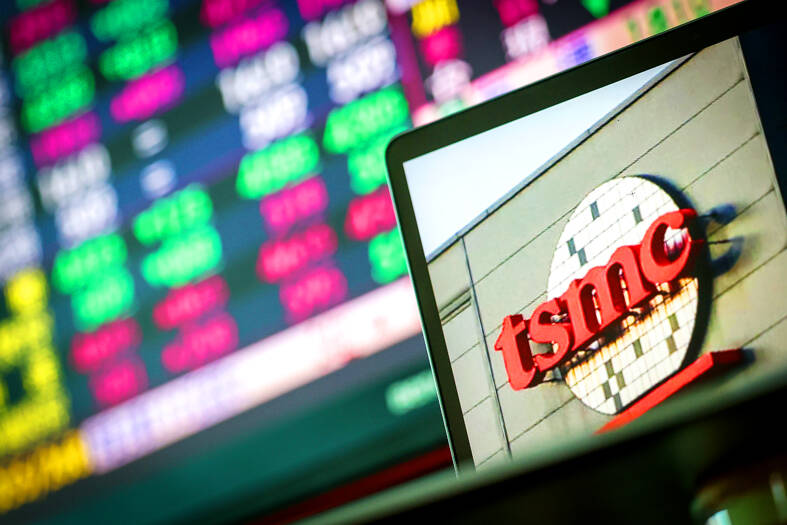The entry of chip giant Taiwan Semiconductor Manufacturing Co (TSMC, 台積電) into the elite club of the world’s most valuable companies is further proof that the generative artificial intelligence (AI) revolution is shaking up Wall Street.
TSMC, which is listed in Taipei and New York, on Monday briefly broke the US$1-trillion market capitalization barrier, putting it ahead of Tesla Inc as the seventh-most valuable technology giant on the stock market.
Also on Monday, Alphabet Inc, Apple Inc and Meta Platforms Inc hit all-time highs.

Photo: CNA
The top 10 of the world’s most valuable companies is headed by Microsoft Corp and Apple, closely followed by AI chip designer Nvidia Corp.
Their global stock market valuations exceed US$3 trillion on Wall Street.
Alphabet and Amazon.com Inc, which recently topped the US$2-trillion mark, follow in an ever-changing ranking.
Oil giant Saudi Aramco slipped into sixth place, followed by Meta, TSMC and Tesla.
“The semiconductor industry is now the leading sector in the S&P 500,” CFRA Research analyst Angelo Zino said recently. “It’s taken over the last 15 or 18 months. That shows you how much the world has changed.”
The explosion in worldwide demand for chips, boosted by the rise of computing-intensive generative AI, promises sustained expansion for the industry.
Chipmakers are not only attracting investors, but also a host of government subsidies.
US President Joe Biden’s administration, for example, has granted tens of billions of dollars in financial support over several years to help build chip factories in the US.
Worldwide sales of semiconductors, which include integrated circuits, microprocessors and memory chips, are expected to reach US$611.2 billion this year, a record for the industry, the Semiconductor Industry Association said.
Sales are expected to jump by 16 percent this year and 12.5 percent next year, the association said.
Nvidia, a designer of graphics processing units (GPUs), is the frontrunner of the craze, and has triumphed on Wall Street in recent months.
Nvidia’s GPUs are a crucial component in building generative AI and since the November 2022 launch of ChatGPT, its market capitalization has increased eightfold.
In the middle of last month, the Santa Clara, California-based group even briefly became the world’s most valuable publicly traded company, ahead of Microsoft at US$3.3 trillion.
“Nvidia’s GPU chips are the new gold or oil of the technology sector,” Wedbush Securities Inc analysts said.
For them, Nvidia, Apple and Microsoft are now engaged in “the race for the 4 trillion dollar market valuation.”
TSMC, with most of its factories based in Taiwan, is well-placed to also reap the rewards.
While Nvidia, which only designs chips, but does not manufacture them, remains discreet about its supply chain, it is widely believed that the bulk of its products are manufactured by TSMC.
The Taiwanese giant, which controls more than half of the world’s semiconductor demand, posted first-quarter sales of US$18.87 billion, up 13 percent year-on-year, while net income climbed 9 percent to US$6.97 billion.
As for Nvidia, its quarterly profit reached US$14.9 billion, a sevenfold increase over the previous year, on sales of US$26 billion.

TARIFFS: The global ‘panic atmosphere remains strong,’ and foreign investors have continued to sell their holdings since the start of the year, the Ministry of Finance said The government yesterday authorized the activation of its NT$500 billion (US$15.15 billion) National Stabilization Fund (NSF) to prop up the local stock market after two days of sharp falls in reaction to US President Donald Trump’s new import tariffs. The Ministry of Finance said in a statement after the market close that the steering committee of the fund had been given the go-ahead to intervene in the market to bolster Taiwanese shares in a time of crisis. The fund has been authorized to use its assets “to carry out market stabilization tasks as appropriate to maintain the stability of Taiwan’s

STEEP DECLINE: Yesterday’s drop was the third-steepest in its history, the steepest being Monday’s drop in the wake of the tariff announcement on Wednesday last week Taiwanese stocks continued their heavy sell-off yesterday, as concerns over US tariffs and unwinding of leveraged bets weighed on the market. The benchmark TAIEX plunged 1,068.19 points, or 5.79 percent, to 17,391.76, notching the biggest drop among Asian peers as it hit a 15-month low. The decline came even after the government on late Tuesday authorized the NT$500 billion (US$15.2 billion) National Stabilization Fund (國安基金) to step in to buoy the market amid investors’ worries over tariffs imposed by US President Donald Trump. Yesterday’s decline was the third-steepest in its history, trailing only the declines of 2,065.87 points on Monday and

TARIFF CONCERNS: The chipmaker cited global uncertainty from US tariffs and a weakening economic outlook, but said its Singapore expansion remains on track Vanguard International Semiconductor Corp (世界先進), a foundry service provider specializing in producing power management and display driver chips, yesterday withdrew its full-year revenue projection of moderate growth for this year, as escalating US tariff tensions raised uncertainty and concern about a potential economic recession. The Hsinchu-based chipmaker in February said revenues this year would grow mildly from last year based on improving supply chain inventory levels and market demand. At the time, it also anticipated gradual quarter revenue growth. However, the US’ sweeping tariff policy has upended the industry’s supply chains and weakened economic prospects for the world economy, it said. “Now

Six years ago, LVMH’s billionaire CEO Bernard Arnault and US President Donald Trump cut the blue ribbon on a factory in rural Texas that would make designer handbags for Louis Vuitton, one of the world’s best-known luxury brands. However, since the high-profile opening, the factory has faced a host of problems limiting production, 11 former Louis Vuitton employees said. The site has consistently ranked among the worst-performing for Louis Vuitton globally, “significantly” underperforming other facilities, said three former Louis Vuitton workers and a senior industry source, who cited internal rankings shared with staff. The plant’s problems — which have not